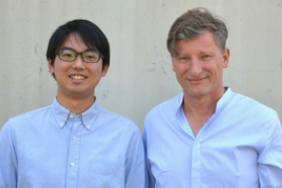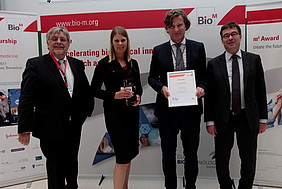A team of researchers led by the winner of the pre-seed competition m4 Award in 2017, Dr. Marcus Conrad of Helmholtz Munich, has discovered a novel cancer treatment agent called icFSP1 that increases the sensitivity of cancer cells to ferroptosis, a process in which iron-dependent oxidative destruction of cell membranes occurs. This has demonstrated a new way of targeting tumors, opening up a new approach to cancer therapy.
Resistance to chemotherapy and metastasis are highly relevant medical problems in the treatment of cancer. Crucially, during metastasis or a change in cell metabolism, certain malignant cancer cells acquire an inherent susceptibility to ferroptosis. Therefore, targeting ferroptosis represents a promising approach in cancer therapy. Ferroptosis is counteracted by ferroptosis suppressor protein-1 (FSP1). Although FSP1 is an effective target of cancer therapies, in vivo effective FSP1 inhibitors that deactivate the enzyme in the body have been lacking.
Therefore, the research team led by Marcus Conrad, Director of the Institute of Metabolism and Cell Death at Helmholtz Munich and m4 awardee of 2017, evaluated the efficacy of about tens of thousands of small molecule compounds and identified the new effective in vivo drug icFSP1 while deciphering the mechanism of action that triggers phase separation of FSP1. As a result, icFSP1 strongly inhibits tumor growth in the body and leads to condensation and inactivation of FSP1 in tumor tissue. Phase separation of FSP1 and the triggering of ferroptosis thus revealed a new way to combat tumors.
icFSP1 is a potent FSP1 inhibitor
Back in 2019, a team of researchers led by Marcus Conrad, director of the Institute of Metabolism and Cell Death at Helmholtz Munich, identified the first specific FSP1 inhibitor, also known as iFSP1. "However, this compound is not suitable for in vivo application and shows undesirable side effects at high concentrations," Conrad explained.
To identify active ferroptosis inducers applicable for in vivo treatment with an effect on FSP1, the team performed a small molecule screening in cells followed by a DMPK ("drug metabolism and pharmacokinetics") validation study. This led to the identification of icFSP1 as a new class of chemical compounds that can make many human cancer cells sensitive to ferroptosis and attenuate tumor growth in the body.
icFSP1 triggers phase separation of FSP1
Furthermore, the researchers conducted an in-depth investigation of the underlying mechanism of action of icFSP1. They were able to show that icFSP1 does not directly inhibit the enzyme activity of FSP1, but triggers a subcellular relocalization of FSP1 that is involved in a specific process called phase separation. These results are thus in contrast to the mechanism of action of the first FSP1 inhibitor iFSP1.
Ferroptosis and phase separation as a key target for novel therapies
Ferroptosis research is receiving much attention in many areas such as cancer, in neurodegenerative diseases, and in ischemia/reperfusion-related diseases. The process of phase separation, a fundamental physical phenomenon, also plays a role in a variety of diseases. The results of this study reveal for the first time a link between ferroptosis and phase separation that will play a central role in the development of novel therapeutic strategies for diseases.
Original publication: Nakamura et al, (2023): Phase separation of FSP1 promotes ferroptosis, Nature. DOI: 10.1038/s41586-023-06255-6
About the m4 Award
With the m4 Award, initiated by BioM in 2011, the Free State of Bavaria supports innovative products, technologies or services of young companies that decisively advance the further development of medicine of the future. The prize is awarded every two years. A total of 30 research projects have been honored in the six rounds of competition to date. 14 spin-offs have been realized since then.


